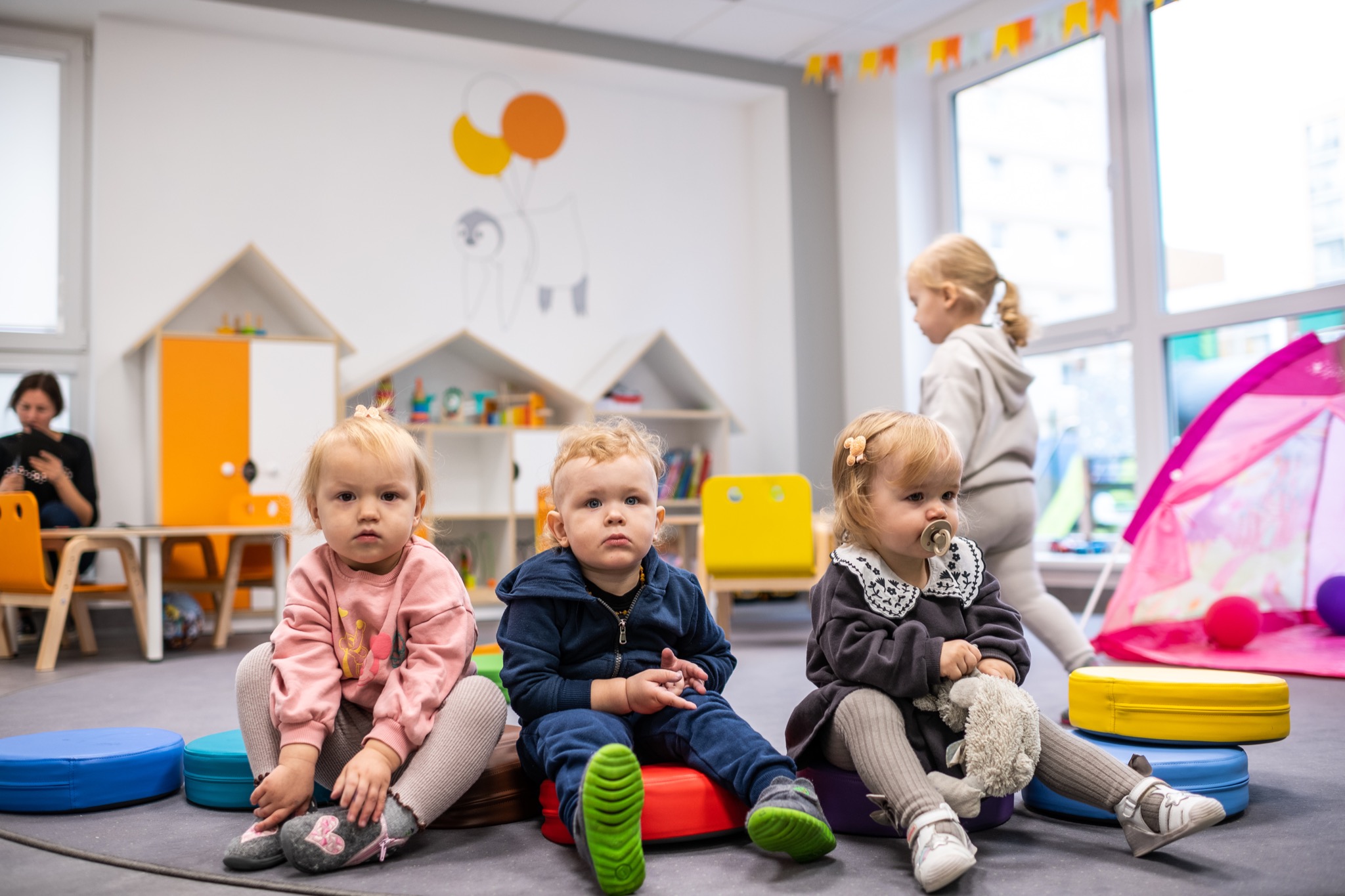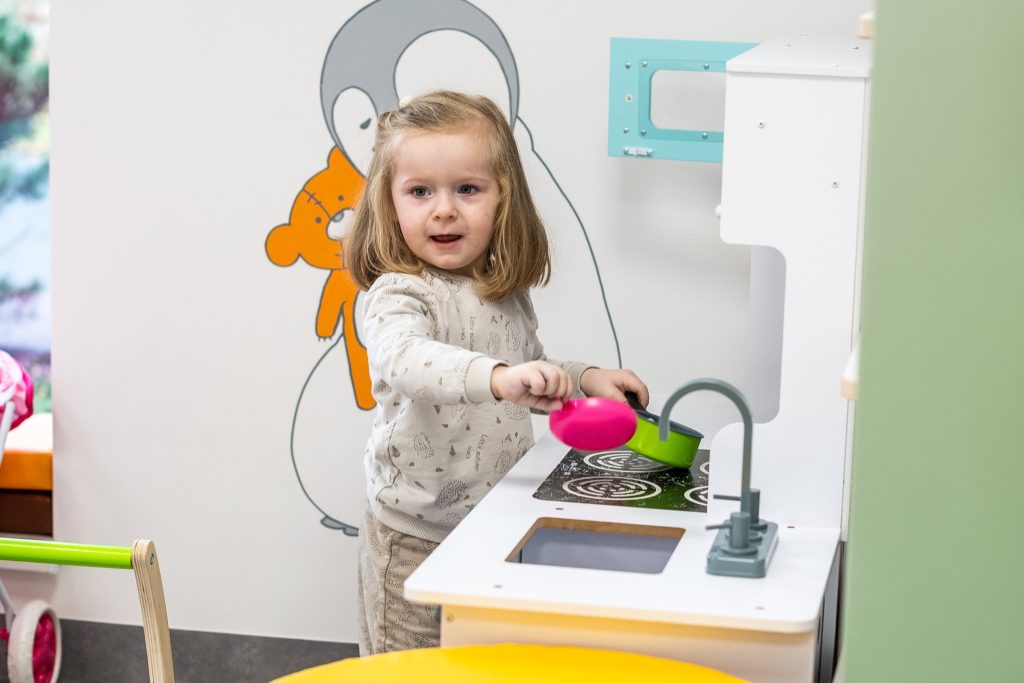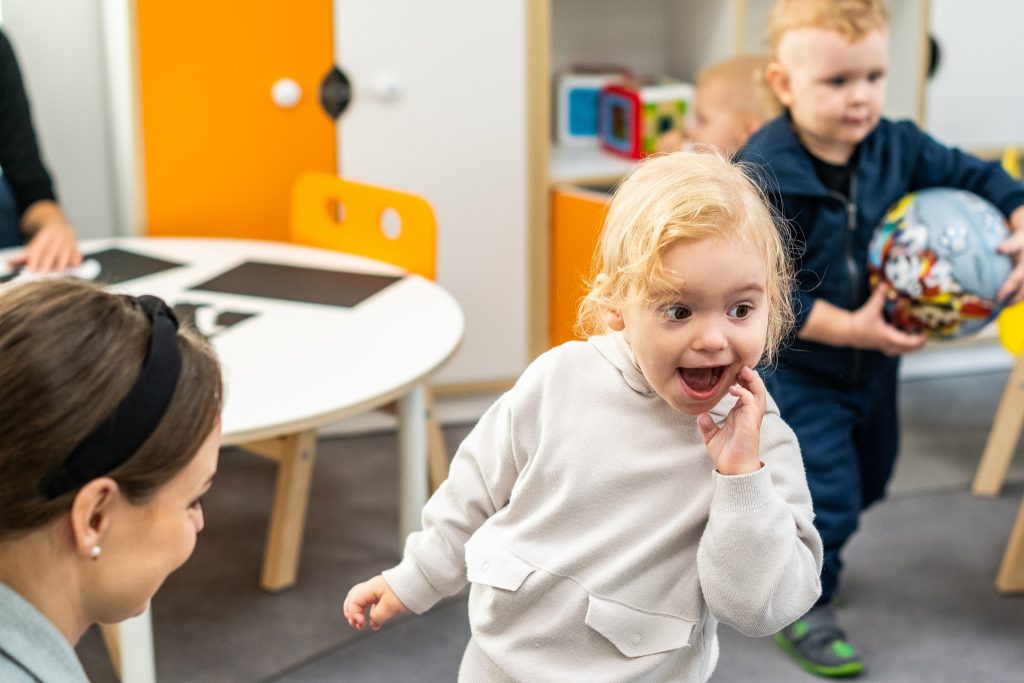Ne vienam tėvui ar mamai dažnai iškyla dilema, kada ir kokiais būdais reikia ugdyti ikimokyklinio amžiaus vaiką, kad iš jo neatimtumėme vaikystės, tačiau tuo pat metu nepraleistume imliausio mokslui vaiko amžiaus. Ekspertų nuomone, sėkmingam ikimokyklinio vaiko ugdymui gali pakakti ir tinkamai subalansuotos ikimokyklinio ugdymo programos.
Šiandien viešoje erdvėje tėvai dažniai diskutuoja dėl savo vaikų ugdymo ikimokykliniame amžiuje. Viena diskusijų pusė dažniausiai teigia, kad vaikai privalo turėti nerūpestingą vaikystę, o rimtesnis ugdymo procesas turėtų prasidėti tik mokykloje.
Tuo tarpu kiti tėvai didžiuojasi, kad jų darželinio amžiaus vaikai jau mokosi įvairių kalbų, lanko ne vieną būrelį, o jų atžalų dienotvarkė yra reikšmingai užpildyta įvairia edukacine veikla.
Ugdymo specialistai vieningai teigia, kad siekiant efektyviai ugdyti savo vaiko gabumus ikimokykliniame amžiuje pirmiausia būtina atsižvelgti į individualią vaiko raidą ir jo poreikius, tačiau, ekspertų nuomone, tinkamas ikimokyklinis ugdymas gali turėti didelę įtaką vaiko gabumams ateityje.
Imliausiai vaiko amžius
Kaip teigia Klaipėdos licėjaus direktorė doc. dr. Regina Kontautienė, ikimokyklinis ugdymas vaikui yra itin svarbus, nes būtent darželyje vaikas praleidžia imliausius mokymuisi savo gyvenimo metus.
„Ikimokykliniame amžiuje vaikų pažintinis aktyvumas yra labai stiprus, jo nereikia papildomai motyvuoti ir skatinti. 3-4 metų vaikui viskas įdomu. Be didelių pastangų jis noriai dalyvauja pažintiniuose, mokymosi procesuose ir be jokių išorinių pastangų kaupia išgirstą informaciją. Todėl labai svarbu šį vaiko raidos etapą panaudoti akademinių gebėjimų lavinimui. Neatsitiktinai daugelyje pažangių šalių pirmą klasę vaikai pradeda lankyti nuo penkerių metų, o priešmokyklinę – nuo ketverių. Mažai valstybių, kuriose į pirmą klasę vaikai pradeda eiti tik nuo septynerių metų“, – teigia Klaipėdos licėjaus vadovė.
Žaidimai – raktas į geresnį pažinimą
Visgi, pasak dr. R. Kontautienės, norint pasiekti gerų vaiko ugdymo rezultatų pirmiausia reikia atsižvelgti į vaiko poreikius, raidą ir kitas individualias savybes. Todėl tokio amžiaus vaikai turi būti ugdomi pasitelkiant žaidimo elementus.
„Tokio amžiaus vaikų tikrai nereikėtų apkrauti kažkokia sudėtinga sausa akademine informacija. Juos būtina sudominti, dėl to ugdymo procesas turi vykti žaidimo forma, skatinant vaiko įsitraukimą ir vaikišką smalsumą. Ypatingai vaiko smegenims bręsti padeda žaidimai, kuriuos vaikui kurti padeda pedagogas. Žaidimo metu vaikas mokosi stebėdamas, klausydamas, mėgdžiodamas, atkartodamas ir pats aktyviai dalyvaudamas kūrybiniame žaidimo procese. Taip žaidžiant palaipsniui bręsta ir vaiko motyvacija bei gebėjimas mokytis“, – teigia Klaipėdos licėjaus vadovė.
Laiko patikrinta metodologija
Darželio-mokyklos „Mažasis Klaipėdos licėjus“ direktoriaus Tomo Raibio teigimu, svarbu suvokti tai, kad vaiko intelektas yra sudarytas iš daugelio skirtingų elementų. Todėl norint tinkamai ugdyti ikimokyklinio amžiaus vaiką svarbu išlaikyti balansą tarp ugdymo sričių.
Pasak darželio vadovo, „Mažajame Klaipėdos licėjuje“ yra taikoma visame pasaulyje pripažinta JAV psichologo Hovardo Gardnerio (Howard Gardner) daugialypio intelekto ugdymo teorija.
H. Gardneris ir jo pasekėjai išskiria viena nuo kitos nepriklausančias 7 intelekto rūšis: matematinę-loginę, verbalinę-lingvistinę, erdvinę-vizualinę, vidinę-asmeninę, tarpasmeninę (bendravimo), kūno-kinestetinę ir muzikinę-ritminę.
„Dažniausiai ikimokyklinio amžiaus vaiko asmenybėje dominuoja 2–3 intelekto rūšys. Kartu su kitomis intelekto rūšimis jos sudaro kiekvienam vaikui savitą unikalią intelektų kombinaciją. Todėl ugdant vaiką svarbu tinkamą dėmesį skirti kiekvienai sričiai, nes taip yra plėtojamas vaiko daugialypis intelektas. Didžiausias dėmesys tokio ugdymo procese yra skiriamas atpažinti ir stiprinti stipriąsias vaiko prigimtines puses, sistemingai pereinant į motyvuotą kitų sričių lavinimą. Šia metodika vadovaujasi ir dauguma privačių mokyklų Jungtinėje Karalystėje“, – teigia T. Raibys.
Kodėl vaikai privalo patirti sėkmę?
Šiandien dažnų diskusijų tema tampa ir neva per didelis šiuolaikinių vaikų saugojimas nuo nesėkmių. Tiek ugdymo specialistai, tiek ir tėvai dažnai diskutuoja ar vaikams įvairiuose konkursuose, nepriklausomai nuo rezultatų, dalijami prizai bei itin atsargus ugdymo įstaigose vartojamas tonas vertinat ikimokyklinio amžiaus vaikų pasiekimus neiškreipia vaiko realybės suvokimo.
Pasak „Mažojo Klaipėdos licėjaus“ vadovo Tomo Raibio, tokia šių laikų ikimokyklinio amžiaus vaikų ugdymo ir skatinimo metodika taikoma neatsitiktinai.
„Ne vienerius metus įvairių mokslininkų vykdytos studijos teigia, kad ikimokyklinio amžiaus vaikams yra ypatingai svarbu patirti sėkmę. Tokio amžiaus vaikus yra itin lengva demotyvuoti bet kuriai veiklai, o jų motyvacijos mokytis varomasis variklis yra būtent sėkmės jausmas. Tačiau dar svarbiau yra skatinti tos sėkmės reflektyvumą. Tiek tėvai, tiek pedagogai turi su vaiku kalbėti apie jo patirtą sėkmę, aiškintis jos priežastis bei analizuoti, ką jis dar ateityje galėtų padaryti geriau. Tai padeda vaikui suvokti ne tik rezultato siekimo, bet ir paties mokymosi proceso prasmę“, – teigia darželio vadovas.
Itin svarbus ugdymo tęstinumas
Kaip teigia Klaipėdos licėjaus direktorė doc. dr. Regina Kontautienė, itin svarbu užtikrinti vaiko ugdymo tęstinumą skirtinguose jo amžiaus tarpsniuose.
Pasak licėjaus vadovės, dažnai vaikui keičiant ugdymo įstaigas susiduriama su skirtingomis jose taikomomis ugdymo metodikomis, dėl to vaikui gali būti sunkiau adaptuotis ir tinkamai vystyti jau anksčiau įgytas žinias.
„Klaipėdos licėjuje mes vadovaujamės tinklinio-daugiapakopio ugdymo principu. Tai reiškia, kad juo nuo darželinio amžiaus palaipsniui pradedame vaiką ruošti licėjuje taikomoms mokyklinėms ugdymo programoms. Taip vaikui pereinant iš vienos ugdymo pakopos į kitą yra užtikrinamas ugdymo tęstinumas. Toks modelis pedagogams leidžia geriau pažinti vaiką ir kasmet vis tiksliau atliepti jo ugdymo(si) poreikius bei sudaryti palankesnes sąlygas jo asmenybės raidai. Tad šiuo atveju ne vaikui reikia prisitaikyti prie mokykloje taikomos ugdymo sistemos, bet ugdymo sistema vis labiau prisitaiko prie vaiko poreikių ir galimybių“, – teigia dr. R. Kontautienė.
Pasak licėjaus vadovės, toks ugdymo modelis leidžia ikimokyklinio amžiaus vaikams ne tik geriau pasiruošti perėjimui prie mokymosi pagal bendrąją mokyklinę ugdymo programą, bet ir suteikia galimybę ateityje vaikui mokytis pagal licėjuje vykdomą pasaulinę Tarptautinio bakalaureato programą.
Ši programa ateityje vaikui gali atverti platesnes galimybes studijuoti ir garsiausiuose pasaulio ir Lietuvos aukštojo mokslo įstaigose.
Most parents are met with a dilemma at some point in their life when they have to decide when and in what ways their preschooler should be educated so that their childhood would not be stripped from them, but so that their most effective years of learning would still be utilized. Experts say that for a child to be able to succeed in the future a good education during their preschool years is and should be enough.
Nowadays, a lot of parents discuss their children amongst themselves in a public manner. One side of the discussion most often states that children must have a carefree childhood, and that a more serious system of educating should be introduced only at school.
On the other hand, other parents are proud of their preschool children who are studying different languages, attent many after-school clubs and have a daily routine that is filled with significant tasks and various educational activities.
Education specialists claim that in order to effectively mold a child’s abilities in their preschool years one has to first look at the individual development of their child, however, it is also said by experts that an appropriately structured preschool education can have a large influence on a child’s abilities in the future.
The most impressionable age of a child
According to the principal of Klaipėdos Licėjus assoc.prof. Dr. Regina Kontautienė, preschool education of children is of high importance, because kindergarten is a place where a child spends most of their impressionable years at.
“Children, in their preschool years, are highly active when it comes to exploration – these children do not have to be motivated or encouraged to explore. A child of 3-4 years of age is interested in everything. Children are highly motivated to participate in exploratory educational processes without any additional encouragement. They also do now have to be externally motivated to gather and retain information.
This is why it is highly important that this period of a child’s life is used effectively for the development of their academic skills. It is no coincidence that in many progressive countries in the world most children start attending first grade from age five, and start attending preschool from the age of four. Very few countries still exist where children attend first grade from age 7”.
Play – the key to a deeper sense of knowing
One has to take into account, according to Dr. R. Kontautienė, that if one wants great results one has to take in the needs of the child – their development and other individual qualities. This is why play is crucial for in the education of such young children.
“Children in this age group should not be overloaded with dry didactic information. They have to be drawn in, and that is why their educational process has to happen in a form of play, encouraging the child to engage and satisfying their childish curiosity. Various games that the child’s teachers help them create are especially useful for the development of a child’s brain. A child learns through listening, observing, mimicking, repeating as well as actively participating in the creative process of the games. This type of play gradually helps develop and solidify the child’ motivation as well as their ability to learn.” – says the head of Klaipėdos Licėjus.
Methodology tested by time
Preschool-and-School “Mažasis Klaipėdos Licėjus” principal Tomas Raibys says that it is important to understand that a child’s intellect is made up of many different elements. Therefore, with the goal to educate a young child in mind, one has to assure a balance in the areas of knowledge that are being taught.
According to the head of the Preschool “Mažasis Licėjus” the world-renowned theory of multiple intelligences by Howard Gardner, a US psychologist, is implemented in the school.
H. Gardner and his followers have separated intelligence into 7 independent kinds of intelligence: Linguistic, Logical/Mathematical, Spatial, Bodily-Kinesthetic, Musical, Interpersonal, Intrapersonal, and Naturalist.
“Most of the time, 2-3 types of intelligence are dominant for each given child. Together with the other types of intelligence they combine into an individual intellectual makeup of a child. That is why, when educating a child, it is important to give appropriate attention to every area of intelligence as that is how multiple types of intelligence are fostered. Using this model of education, most commonly, most attention is allocated to recognizing and facilitating the strong-suits of every child to asses what they are naturally gifted, and, then, transitioning to a motivated development of other areas of knowledge.
This method is used by most private schools in the U.K.” -says T. Raibys.
Why must students experience success?
Many discussions are also had about the ways in which children are nowadays shielded from failure. Education specialists as well as parents often have discussions whether or not children, participating in various competitions, should be given a prize. The discussion also carries on to the tone of how the achievements of preschoolers should be evaluated, and whether or not, strategy of reward warps the way a child sees themselves.
According to the head of “Mažasis Klaipėdos Licėjus” Tomas Raibys, this strategy of educating preschoolers is used not without reason.
“Longitudinal studies done by various scientists state that it is vitally important to experience success for preschoolers. Children in this age group are very easily demotivated from doing anything, and the engine for their motivation is the feeling of success. It is even more important to facilitate the reflection of that success. Parents as well as teachers have to talk to the child about their success, analize how it came about and what the child could do better next time. This helps the child better understand the meaning behind the result they have received as well as the process of learning they underwent.” – says the head of the kindergarten.
Continuity of Education is extremely important
According to the principal of Klaipėdos Licėjus, Dr. Regina Kontautienė it is crucial that the continuity of a child’s education throughout the different stages of their development is assured.
According to the head of Licėjus, when a child is in the process of adjusting to new institutions of education it is common that that child has to transition between different methodologies of educating – this can cause the student a lot of difficulties adapting and properly developing their previous knowledge. “In Klaipėdos Licėjus we organize teaching through a network-based multi-stage principle of education. This means that a student is taught the skills to study within the educational guidelines they will need to be able to study in Licėjus as early as kindergarten. That is why, as a student transitions from one institution to another within Licėjus the continuity of their education is assured. This model allows the educators to better understand their students and their needs and to, each year, assure better quality of the development of their knowledgeability and their character. This makes it possible for the educational system to adjust to the student and their abilities and needs more each year instead of making it the student’s responsibility to adjust to the school.” – states Dr. R. Kontautienė.
According to the head of Licėjus, this model of education allows preschool students to not only be better prepared for the transition from preschool to the national system of education, but also gives the child the opportunity to, in the future, study in the IB programme in Licėjus.
In the future, this programme can provide the child with a wider range of opportunities to study in the world’s most renowned Universities and in higher places of education in Lithuania.




